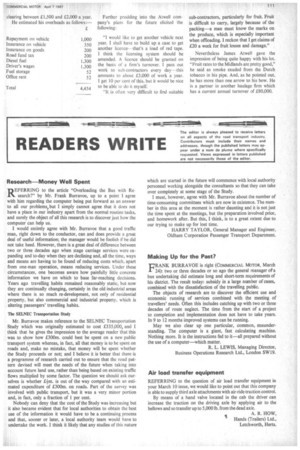READERS WRITE
Page 113

If you've noticed an error in this article please click here to report it so we can fix it.
Research—Money Well Spent REFERRING to the article "Overloading the Bus with Research?" by Mr. Frank Burravoe, up to a point I agree with him regarding the computer being put forward as an answer to all our problems,,but I simply cannot agree that it does not have a place in our industry apart from the normal routine tasks, and surely the object of all this research is to discover just how the computer can help us.
I would entirely agree with Mr. Burravoe that a good traffic man, right down to the conductor, can and does provide a great deal of useful information; the manager would be foolish if he did not take heed. However, there is a great deal of difference between two or three decades ago when stage carriage services were expanding and to-day when they are declining and, all the time, ways and means are having to be found of reducing costs which, apart from one-man operation, means reducing services. Under these circumstances, one becomes aware how painfully little concrete information we have on which to base far-reaching decisions. Years ago. travelling habits remained reasonably static, but now they are continually changing, certainly in the old industrial areas where there is so much re-development, not only of residential property, but also commercial and industrial property, which is altering passengers' travelling habits.
The SELNEC Transportation Study
Mr. Burravoe makes reference to the SELNEC Transportation Study which was originally estimated to cost £335,0000 and I think that he gives the impression to the average reader that this was to show how £300m. could best be spent on a new public transport system whereas, in fact, all that money is to be spent on roads and, make no mistake, that money will be spent whether the Study proceeds or not; and I believe it is better that there is a programme of research carried out to ensure that the road pattern devised will meet the needs of the future when taking into account future land use, rather than being based on existing traffic flows multiplied by some factor. The question we should ask ourselves is whether £-}m. is out of the way compared with an estimated expenditure of £300m. on roads. Part of the survey was involved with public transport, but it was a very minor portion and, in fact, only a fraction of 1 per cent.
Nobody can deny that the cost of the Study was increasing but it also became evident that for local authorities to obtain the best use of the information it would have to be a continuing process and that, sooner or later, a local authority team would have to undertake the work. I think it likely that any studies of this nature which are started in the future will commence with local authority personnel working alongside the consultants so that they can take over completely at some stage of the Study.
I must, however, agree with Mr. Burravoe about the number of time-consuming committees which are now in existence. The number in this area at the moment is rather daunting and it is not just the time spent at the meetings, but the preparation involved prior, and homework after. But this, I think, is to a great extent due to our trying to make up for lost time.
HARRY TAYLOR, General Manager and Engineer, Oldham Corporation Passenger Transport Department.
Making Up for the Past?
-RAN1( BURRAVOE is right (COMMERCIAL MOTOR, March 24): two or three decades or so ago the general manager of a bus undertaking did estimate long and short-term requirements of his district. The result today: subsidy in a large number of cases, combined with the dissatisfaction of the travelling public.
The objects of research are to discover the efficient use and economic running of services combined with the meeting. of travellers' needs. Often this includes catching up with two or three decades of route neglect. The time from the start of a project to completion and implementation does not have to take years. In 9 to 12 months improved systems can be running.
May we also clear up one particular, common, misunderstanding. The computer is a giant, fast calculating machine. Nothing more. It is the instructions fed to it—all prepared without the use of a computer—which matter.
R. L. LEWIS, Managing Director, Business Operations Research Ltd., London SW19.
































































































































































